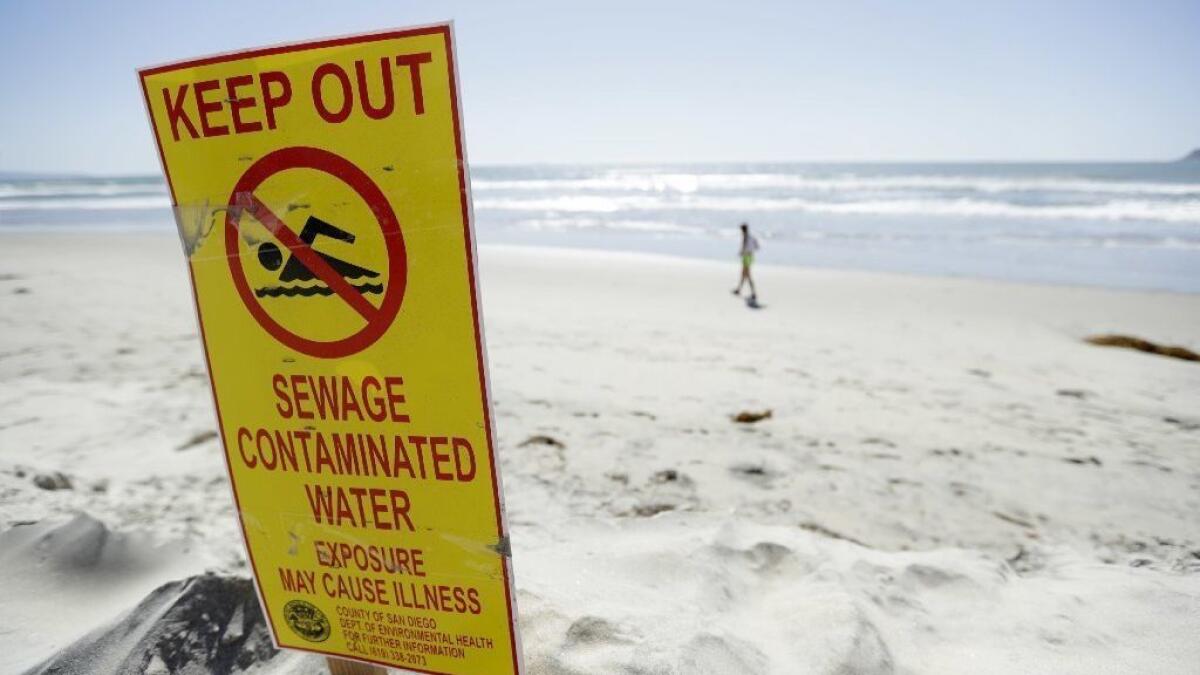Ongoing spill in Mexico is flooding Tijuana River and U.S. beaches with millions of gallons of raw sewage

The equivalent of more than 6 million gallons a day of raw sewage has been spilling into the Tijuana River since Monday night, according to U.S. officials.
The U.S. section of the International Boundary and Water Commission said Tuesday that counterparts in Mexico informed the agency that the cause of the sewage leak was a ruptured collector pipe. Officials said the aging collector underwent millions of dollars in upgrades over the last year but is not fully rehabilitated.
“We are in close contact with Mexico,” said Lori Kuczmanski, spokeswoman for IBWC. “We have engineers in the field getting the details of the incident.”
Shorelines from Imperial Beach to Coronado have been closed for several days because of polluted water that flushed through the Tijuana River after recent rains, according to the San Diego County Department of Environmental Health.
But this new spill could dramatically exacerbate the situation.
“There’s communication from the IBWC, but Mexico should have let us know yesterday,” said Imperial Beach Mayor Serge Dedina, who has called for an investigation into when the spill occurred. “There’s no way that a pipe broke down three days after the flood. It seems suspicious.”
South Bay beaches are routinely inundated with polluted water from Mexico, especially during rain events when pumps that suck water out of the Tijuana River must be turned off because of limited capacity. Wastewater is supposed to be treated before it’s emptied into the river, but flows are routinely mixed with other pollutants, including raw sewage from cracked pipes.
Residents are advised to stay out of the ocean 72 hours after it rains because of contamination from urban runoff, but sewage-tainted pollution is far more dangerous. Raw effluent can carry pathogens such as E. coli, vibrio and salmonella, as well as viruses and intestinal parasites that can cause ailments including diarrhea, meningitis and respiratory infections.
In September, California Atty. Gen. Xavier Becerra joined the cities of Imperial Beach, Chula Vista and the Port of San Diego in suing the Trump administration over sewage spills and other toxic flows coming from Mexico.
The lawsuit seeks to force the federal government to upgrade the capacity of the pumps in the river as well as catch basins in nearby canyons. The systems are intended to divert flows to the South Bay International Wastewater Treatment Plant before they can foul beaches.
The state’s lawsuit focuses more narrowly on water pollution flowing through the canyons.
“This is exactly why we filed our lawsuit,” Dedina said. “We should have infrastructure that can capture the sewage and send it back into the system.”
The federal government has said it isn’t legally responsible for the renegade flows that escape its collection systems, pointing out that the situation would be significantly worse without its efforts.
Before the federal government spent about $344 million to create its diversion and treatment system in the 1990s, millions of gallons of sewage would flow daily down the Tijuana River into San Diego County.
For several years officials with the IBWC have attempted to work with officials in Baja to outline a spending blueprint for improving the region’s failing wastewater infrastructure. But only limited progress has been made.
If this latest spill continues unabated, it could be the largest since February 2017 when a pipe burst and flooded the river with at least 28 million gallons of raw sewage, tainting coastal waters for weeks.
According to county records, the Imperial Beach shoreline is off-limits to swimmers about a third of the year on average as a result of water pollution from Tijuana.
Smith writes for the San Diego Union-Tribune.
joshua.smith@sduniontribune.com
More to Read
Sign up for Essential California
The most important California stories and recommendations in your inbox every morning.
You may occasionally receive promotional content from the Los Angeles Times.











